Former Contributors
Our previous correspondents (in chronological order with most recent first):
Caroline Ferguson, Fellow | Caroline’s posts
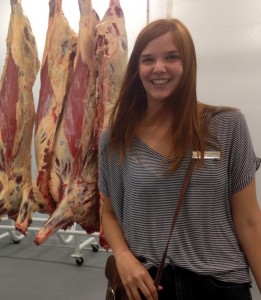
Fellow Caroline Ferguson
I grew up in a house in the woods on Bainbridge Island, a ferry ride away from Seattle. It was a place of profound natural beauty and abundance: foraging for blackberries, harvesting herbs from the vegetable garden, and looking for shellfish under rocks at the beach felt as normal as a trip to the grocery store. This led to a deep appreciation for the ways nature nurtures our minds, bodies, and spirits — and in turn, a passion for nourishing the people I loved. I developed a fascination with cooking, eating, and all things food that persists to this day.
By the time I’d started an undergraduate program at Seattle University, I’d become aware of the problems that plagued American agriculture. I attended a food justice service immersion at my college, did a service learning stint at a children’s garden in the housing projects near campus, and took more and more local food stories for the student newspaper, but still I stuck to my education major. It was as though food was so deeply woven into my life and worldview that it took me a while to see it was what I cared about most. But after nine months of interning in Seattle Met Magazine’s local food department and launching an online food column for the campus newspaper, I’d more or less figured it out.
After graduating from Seattle U, I knew I wanted to enact positive change in the food sphere, but I wasn’t sure how. I scrounged up my savings and left for southwestern France, where I spent an incredible summer traveling and WWOOF-ing on a permaculture sheep farm. After coming home I started baking at Amandine , a small bakeshop in Seattle with a commitment to responsible local sourcing. I learned classic French pastry technique, managed the social media and website, and also assumed a food recovery role at the bakery, donating leftover pastries to local food banks. Meanwhile I grew my journalism career, writing bimonthly features on Pacific Northwest’s farmers and producers for Edible Seattle and maintaining a column in a feminist food and culture magazine. In the summer of 2016 I executed a long-form feature for Seattle Met magazine on slaughterhouse consolidation.
I’m thrilled that my circuitous path has led me to Bon Appetit, a company that understands that cooking and sharing meals together should be as good for the earth as it is for our spirits.
Claire Kelloway, Fellow | Claire’s posts
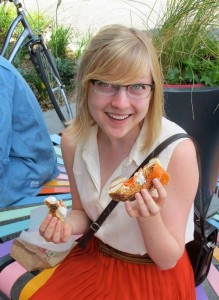 Born and raised in Minnesota, I graduated from Carleton College with a bachelor’s degree in political science and a concentration in political economy. I worked for Carleton’s Center for Civic and Community Engagement as an educational associate for food and environment, supporting Carleton’s Real Food Calculator working group and other student food initiatives. I also wrote a food column for The Carletonian and was design editor of Carleton’s award-winning student-run magazine, The Lens. My writing has appeared in Civil Eats and ProPublica.org. I am also interested in corporate social responsibility, and last summer I was the sustainability intern for Annie’s Inc. I collaborated with the sustainability team at General Mills to draft a Pollinator Protection Plan for Annie’s supply chain and create a new system for communicating packaging sustainability across departments.
Born and raised in Minnesota, I graduated from Carleton College with a bachelor’s degree in political science and a concentration in political economy. I worked for Carleton’s Center for Civic and Community Engagement as an educational associate for food and environment, supporting Carleton’s Real Food Calculator working group and other student food initiatives. I also wrote a food column for The Carletonian and was design editor of Carleton’s award-winning student-run magazine, The Lens. My writing has appeared in Civil Eats and ProPublica.org. I am also interested in corporate social responsibility, and last summer I was the sustainability intern for Annie’s Inc. I collaborated with the sustainability team at General Mills to draft a Pollinator Protection Plan for Annie’s supply chain and create a new system for communicating packaging sustainability across departments.
Autumn Rauchwerk, Fellow | Autumn’s posts
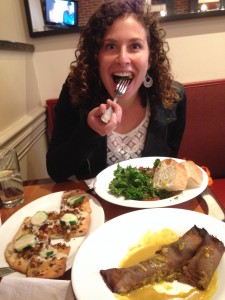 My love for food took root when I was a child going to my grandmother’s house for dinner, foraging for fruit in my backyard, and figuring out how to maximize the number of times we could have a party and eat snacks in dance class instead of learning how to pirouette.
My love for food took root when I was a child going to my grandmother’s house for dinner, foraging for fruit in my backyard, and figuring out how to maximize the number of times we could have a party and eat snacks in dance class instead of learning how to pirouette.
I am an American University graduate with a bachelor’s in environmental studies. My love for Bon Appétit began at the beginning of college, where the buffet-style “caf” was so good that my parents decided to forego the plethora of restaurants Washington, DC, has to offer in favor of eating on campus whenever they came to visit. Thanks to Bon Appétit, I was able to transition to vegetarianism and then veganism, slowly learning all of the creative options that existed and eventually how to prepare them myself.
The semester I spent abroad in Costa Rica and my experience living in American Samoa for a National Oceanic and Atmospheric Administration fellowship honed my passion for food justice and sustainability. When I returned from my travels, I worked with the Bon Appétit team to start a Food Recovery Network chapter on campus. Once I graduated, I worked for the Food Recovery Network national team, managing the expansion team and working one on one with students around the country to help them launch food recovery programs on their campuses.
At the Food Recovery Network, I worked closely with Claire Cummings, Bon Appétit’s Fellow-turned-waste-specialist. She and the rest of the Fellows demonstrated such a deep passion for sustainability, faith in how much of a difference educational accounts can make, and a desire to work through the challenges and figure out how to make the system better that I came away very impressed. I feel so lucky to be a part of this team and am excited to learn and share with managers, chefs, students, faculty and farmers up and down the West Coast!
Sea Sloat, East Coast Fellow, BAMCO Foundation | Sea’s posts
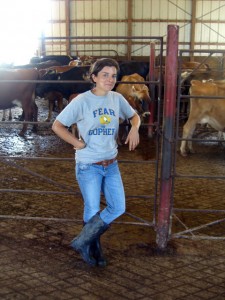
A Nebraska farm I worked on through WWOOF
As the fourth child in a line of six siblings, my passion for food manifested early, in spirited fights for the first Sunday morning waffle or the last piece of birthday cake. Equally spirited was my aversion to my mother’s medley of chickpeas and Swiss chard, and to helping grow our summertime tomatoes.
Food first fascinated me as a teenager, when I spent a year as a high-school exchange student in Paraguay and learned that food culture is not just what you eat, but how you eat it. Mandatory daily family lunches, and regular Sunday asado barbecues with my host family and friends created spaces where people connected and shared the many other pieces that create the fabric of a culture.
A solo road trip across the United States in summer 2011 became a quest to answer my lingering questions about where food fits into culture, and how our food policies were affecting countries beyond our borders. Along the way I volunteered as a wandering farmhand through World Wide Opportunities on Organic Farms. I weeded vegetables and picked berries in Minnesota, milked cows and made cheese in Nebraska, and raised mushrooms in California. Food quickly transformed into a political fascination for me as I witnessed the purity of small organic farms set against the backdrop of thousands of acres of government-subsidized corn and soy fields.
At Goucher College, I structured my field of International Relations around food politics, using food as a lens for identifying social inequities. While researching American hunger and food waste, I discovered the collegiate Food Recovery Network and contacted Bon Appétit’s general manager at Goucher, Tom Brown, to see if we could start a chapter. Four days later, we had done just that, and so started my relationship with Bon Appétit. Most recently, I worked with a Goucher professor to interview Latino farmers about the opportunities and challenges they face when attempting to start their own farms.
I have worked with food on farms, in restaurants, and as an academic. Now I am ecstatic to join the Bon Appétit team as the new East Coast Fellow, where I can better support student passion and activism about food. And, hopefully I can convince a few students that there is actually a lot to love about locally grown Swiss chard and chickpeas.
Alyse Festenstein, Midwest Fellow, BAMCO Foundation | Alyse’s posts
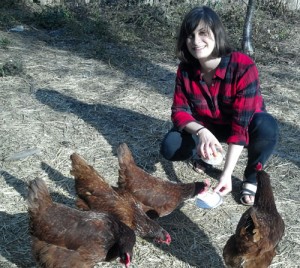 As I child I waited all week for Sunday evening dinners at my grandmother’s house. She was like a magician in the kitchen — skillfully maneuvering around her apartment kitchenette, whipping up dishes as if out of thin air. Through her Pepto-Bismol colored borscht, pickled beef tongue, and lots of schmaltz, she introduced me to the flavors of our Eastern European roots and Jewish culture. While I have to admit I never did get used to the flavor (or idea) of the tongue, the food and stories shared around the table kept me sated with a connection to my history. The Sunday ritual firmly grounded me in a network of people, places, and an identity. These dinners were my first lessons about the power of good food to build connections between people.
As I child I waited all week for Sunday evening dinners at my grandmother’s house. She was like a magician in the kitchen — skillfully maneuvering around her apartment kitchenette, whipping up dishes as if out of thin air. Through her Pepto-Bismol colored borscht, pickled beef tongue, and lots of schmaltz, she introduced me to the flavors of our Eastern European roots and Jewish culture. While I have to admit I never did get used to the flavor (or idea) of the tongue, the food and stories shared around the table kept me sated with a connection to my history. The Sunday ritual firmly grounded me in a network of people, places, and an identity. These dinners were my first lessons about the power of good food to build connections between people.
As a college freshman at Washington University in St. Louis, I joined the student farm on a whim. Food and flavor were a foundational component of my upbringing, but growing up in the suburbs I had never given much thought to growing food or the agricultural system that produced it. It only took a couple of days at the Burning Kumquat Student-Run Farm (the BK) to awaken a deep curiosity about the food system. From lessons in pest management and soil health to selling produce at the city farmers’ market and learning about the agribusiness giants in our own backyard, the BK showed me that eating and growing food are political acts. Sharing a meal, caring for the soil, and learning about food issues bring people from all sorts of backgrounds together to help change a broken, unjust system.
During my years at Washington University, I organized events to inspire appreciation of food, build community, and raise awareness about the impact of agriculture on people and the environment. This work pushed me to explore further. Through my studies in anthropology and economics, I focused on the impact of of Western models of economic development on agricultural practices and communities. I spent my summers interning with a farmers’ market in a neighborhood with little access to fresh produce, volunteering on a small goat dairy, and working with The Healthy Schools Campaign for food justice in Chicago’s public schools and communities.
I have always admired Bon Appétit for its commitment to use its purchasing power to push the food industry towards sustainability, and I could not be more excited to join the team as the Midwest Fellow. I see it as incredible opportunity to connect students with the stories and people behind their food and help them engage with the most critical issues in our agricultural system.
Andrew Monbouquette, West Coast Fellow, Bon Appétit Management Company Foundation
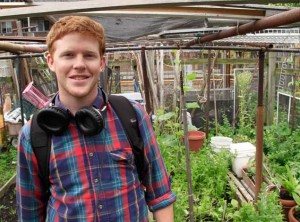 After growing up in Nebraska, the land of corn and cattle, I didn’t hear the term “sustainability” until I enrolled at Willamette University in Salem, OR, in 2006. And not until my sophomore year did I really connect the need for sustainability to the food system. I thought sustainability was all about recycling, driving personal cars less, and turning off electronics after leaving a room. However, the Bon Appétit-run café I relied on three times a day soon clued me in to food’s link to climate change — and shocked me in the best way possible.
After growing up in Nebraska, the land of corn and cattle, I didn’t hear the term “sustainability” until I enrolled at Willamette University in Salem, OR, in 2006. And not until my sophomore year did I really connect the need for sustainability to the food system. I thought sustainability was all about recycling, driving personal cars less, and turning off electronics after leaving a room. However, the Bon Appétit-run café I relied on three times a day soon clued me in to food’s link to climate change — and shocked me in the best way possible.
Exposure to the unsustainable aspects of the food system ultimately inspired me to partner with a friend from middle school to make a documentary film about urban farming, called Growing Cities. We traveled more than 13,000 miles across the United States, meeting the men and women challenging the status quo of food production and inspiring people to re-imagine whats possible in urban settings. Set to release this spring, the film is dedicated to food and social justice, youth empowerment, and the revitalization of local economies and vacant land. (Watch the trailer.)
Producing Growing Cities not only allowed me to explore one of my strongest passions in filmmaking but also developed my passion for using food as a tool to grow healthy communities. The experiences I gained will no doubt help in my new role as Bon Appétit’s West Coast Fellow. I’m eager to infect students with my enthusiasm and give them the tools to participate more knowledgeably in their food system.
S.K. Piper, Sustainability Manager with BAMCO at Denison University in Granville, OH
Former Midwest Fellow, Bon Appétit Management Company Foundation | Piper’s posts
When I started my college education at Case Western Reserve University, I was already interested in animal rights. I was a vegetarian throughout much of my childhood, and have rescued animals for as long as I can remember, whether it was lady bugs from drowning in the local pool, worms from being stepped on along the sidewalk on my way to elementary school, or rats from being euthanized at my high school. But I hadn’t had any real experience with activism until a Spanish teacher inspired me by talking about all the injustices happening in Latin America, like El Mozote Massacre, the School of the Americas, sweatshop labor, etc. I took off running, organizing trips to protests, events on campus, even making presentations trying to get campus groups to switch to Fair Trade t-shirt suppliers.
Food became a way for all my interests in the environment, workers’ rights, and animal welfare to come together. I switched to being a vegan and buying organic produce at the local food co-op, and with the help of Bon Appétit’s CWRU team, I put on educational events that served only Low Carbon food (for an Earth Day event one year, we served all-local, vegan dishes). When it came time to do my senior project in environmental studies, I chose to work with a local non-profit that was campaigning against palm oil plantations because in their quest for more land, they were displacing entire communities. My final paper was titled “United States Driven Repression and Environmental Destruction in Columbia”, and focused largely on how foreign policies such as Plan Columbia and agribusinesses such as palm oil were causing deforestation of the Amazon rainforest.
My path to becoming Bon Appétit’s new Midwest Fellow started through a serendipitous meeting with current Fellow Carolina Fojo, who I invited to speak at a Fair Trade expo on one of her visits to CWRU. I am so excited to be able to continue planning events and raising awareness on college campuses about the important issues surrounding food. When trying to explain to a friend at CWRU what I’d be doing for Bon Appétit, she interrupted me and said, “So it’ll be just like college for you, except without all the classes!”
The other half of the Fellows’ job is to visit the local farms that provide food to our cafés and help inform consumers about the food they’re eating. Bon Appétit has so many amazing initiatives: I’m honored to be a part of this team and to be able to help educate people about how their food affects people, animals, and the environment.
Liz Sullivan, project assistant | Liz’s posts
I grew up in a home with an environmental lawyer and a therapist, making me acutely aware of the importance of protecting the planet and having compassion for those around me. At age nine, these characteristics manifested as a protest against the development of a nearby field — home to jack rabbits, owls, and native plants — into a movie theater. Though my poster-and-letter-writing campaign was ultimately unsuccessful, the activist seed was planted. It expressed it self in different ways throughout high school and college, and it wasn’t until I moved to San Francisco after graduating that I discovered a passion for local, sustainable food.
And once I realized it, I started making changes left and right. The farmers market became a Saturday morning ritual. My kitchen saw a lot more action. When I did go out, I asked befuddled waiters where the fish on my plate came from. After reading Fast Food Nation and The Omnivore’s Dilemma, I committed to vegetarianism and became passionate about learning about the industrial agriculture system. I started shopping at a local co-op for groceries and discovered the joy of the bulk bins. I was, and continue to be, fascinated by the intersection of food with individual health, the environment, and social norms.
My journey was mainly personal until I started working at Bon Appétit. Here, I found people who are not only passionate about changing the food system, but are actually taking action to do something about it. In my position as project assistant, I work on all sorts of interesting projects, from writing blog posts to supporting the team in the field. I am proud to be a part of an innovative company that continues to successfully challenge the status quo.
Carolina Fojo, East Coast Fellow, BAMCO Foundation |Carolina’s posts
When people ask me how I got into food activism, I tell them: “It all started with clothes.” Having always enjoyed designing and sewing my own clothes (I’m a crafter at heart with a propensity for bright colors), in college, I became fascinated of the question of where my clothes come from. Unfortunately, it didn’t take me long to realize that pretty much everything I purchase in a store was probably made under sweatshop conditions (low wages/no wages, physical and verbal abuse, rape, even slavery in some cases)… and that got me thinking: What about all the other things I buy? I mean, everything comes from somewhere, right? This is especially important when making food choices.
One of my biggest weaknesses is chocolate. (That and fortune cookies…don’t ask!) And there is just something about biting into a piece of rich, creamy-smooth milk chocolate that came from cocoa beans that were likely picked by someone who was trafficked and consequently enslaved… that just rubs me the wrong way. So all of a sudden, here I am—a color-loving-crafter-gone-food activist working at Bon Appétit Management Company. I figure that since I eat, I have a responsibility to try and make sure that what I’m eating benefits not only me but the world around me as well. And I consider it an honor to be working for a company that agrees with me on that point as well.
As for my role at Bon Appétit — I’m the East Coast Fellow. I spent about half my time traveling to college campuses along the East Coast, putting on events, speaking with students, and trying to raise awareness about different food sustainability issues. The other half I travel to farms—talking to farmers and farmworkers, trying to get a better understanding of what issues exist at the farm level.
Vera Chang, West Coast Fellow, Bon Appétit Management Company | Vera’s posts
I fell in love with farms while studying in Damaraland, Namibia during college. I hadn’t guessed that it would be the farmers, not the nearly-extinct desert-dwelling black rhinoceros I set off to research, who would change my way of looking at the world. The more time I spent studying the local habitat, the more I learned about the challenges farmers face and the more respect I gained for their perseverance and strength.
When I returned to Carleton College, located between fields of corn and soybeans in Northfield, Minnesota, I decided it was time to make changes to the way we ate food on campus. I wanted to support farmers and businesses I believed in. Thus, the Food Truth movement for more sustainable and just food was born. Among bike pedaled smoothies, panels on ethical eating, and tours to local farms, our campus community decided that after 40 years of the same foodservice provider at Carleton, this was the perfect time to bring Bon Appétit Management Company to our campus. We wanted more delicious dining but also – and most important – real food from good farms.
Since my passion for food began, I have learned about and practiced urban agriculture, permaculture design, and organic farming. I have worked on food policy at the campus, state, and, now with Bon Appétit, national level. I know that whenever I am not growing food full-time myself, I will advocate and work to support the people who do.
I joined Bon Appétit Management Company as the West Coast Fellow in 2009 because Fellows are in the unique position of travelling to the farms that supply food to our kitchens, and learning firsthand the challenges faced by those who produce food. In my travels, I meet Bon Appétit chefs, growers, and diners. All advocate having a food system that is transparent, safe, healthy, and fair for farmers, farmworkers, and eaters alike. I am proud to work for a foodservice company whose values are stitched into who we are from inside out.